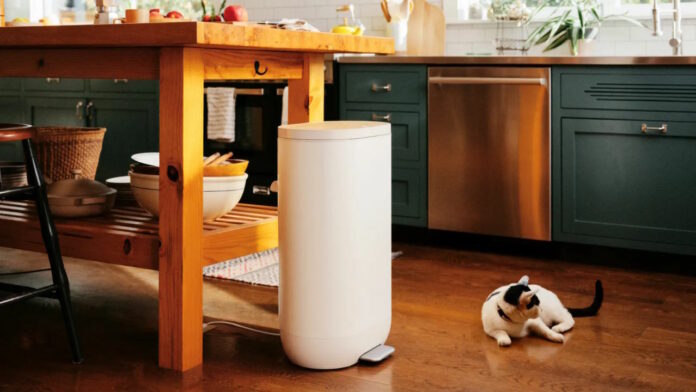Matt Rogers, former Apple engineer and co-founder of Nest, has now turned his attention to keeping our food waste out of landfills.
Rogers just launched his latest venture called Mill, which is centered around a new “food-shrinking, de-stinking” kitchen bin(Opens in a new window). The idea is to stop all our food waste ending up in landfill and instead converting it into a form that can be mailed to farms and reused as nutritious chicken feed.
Rogers explains, “Mill makes it easy to do the right thing. Food isn’t trash. But until today, it was hard to do anything except throw uneaten food in the garbage. The Mill Membership is a simple way to keep food out of landfills, send it back to farms, and make your kitchen smell awesome.”
The Mill bin accepts all your kitchen scraps and automatically dries and grinds them each night resulting in something that looks like coffee grounds. You can keep filling the bin for weeks without having to empty it due to how much shrinkage occurs from the drying and grinding process.
Contents of the Mill kitchen bin before and after the dehydration and grinding process.
(Credit: Mill)
Mill says “if you can eat it, so can the bin,” meaning fruit, vegetables, meat, fish, dairy, eggs, food-soiled paper (napkins, filters, paper towels), rinds, peels, pits, and even bones (e.g. chicken, fish) can be thrown in without causing any problems. A Mill app will keep tabs on how full the bin is, handles scheduling your grounds collections, and contains a library of foods so you can always check to make sure a food item can be safely thrown in.
Recommended by Our Editors
The bin measure 27-by-16-by-15 inches and the bucket volume is 11 liters. It has a locking lid to prevent any accidents during grinding, is constructed from powder-coated steel, and uses a coconut-based charcoal odor filter. Other than filling it with food and emptying the grounds, there’s nothing else required for this food recycling system to work. In terms of energy use, Mill says the bin uses 1 kilowatt-hour (kWh) of electricity per day based on 1.5 pounds of kitchen scraps being added every day.
A Mill membership costs $33 per month if paid annually or $45 month-to-month. Paying annually also gets the Mill bin delivered for free, where as monthly membership requires a $75 bin delivery charge. The subscription includes prepaid return boxes, shipping fees, scheduled pickups, and fresh supplies when you need them. Memberships are expected to become available in the spring, but you can reserve a spot now(Opens in a new window) by entering your email address.
Get Our Best Stories!
Sign up for What’s New Now to get our top stories delivered to your inbox every morning.
This newsletter may contain advertising, deals, or affiliate links. Subscribing to a newsletter indicates your consent to our Terms of Use and Privacy Policy. You may unsubscribe from the newsletters at any time.
Hits: 0













